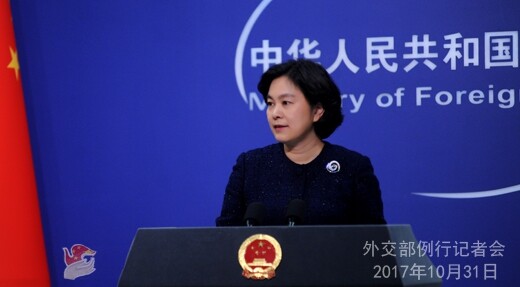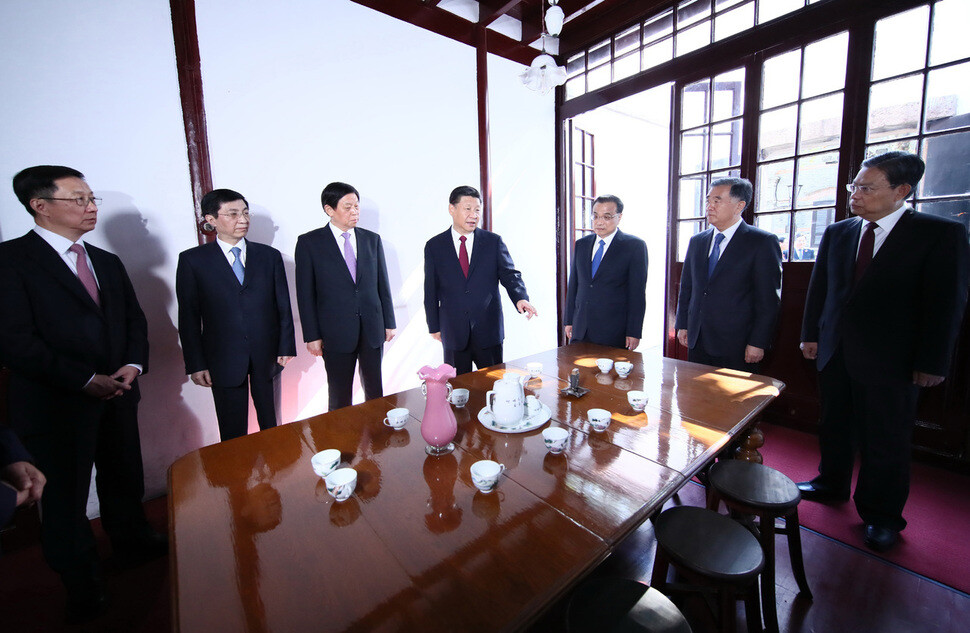hankyoreh
Links to other country sites 다른 나라 사이트 링크
[News analysis] Chinese concessions on THAAD speak to fears of losing influence on Korean Peninsula

The South Korean and Chinese government’s agreement to resolve their conflict over the THAAD missile defense system deployment appears to have been based in careful diplomatic, strategic, and economic considerations by the second-term leadership of the administration launched last week under Chinese President Xi Jinping.
The state-run CCTV network and other Chinese media devoted major coverage to a document posted on the morning of Oct. 31 to the Foreign Ministry homepage, which read that China and South Korea had “deliberated on China-South Korea relations.” The document also said the two sides were “working to bring the bilateral relations back to the track of normal development.” Later that afternoon, Chinese Foreign Ministry spokesperson Hua Chunying said this “conform[s] to the common interests of the two sides.”
The shift in events coincides with the launch of the leadership for Xi’s second term, which came following the 19th Chinese Communist Party National Congress last week. Of his newly proposed diplomatic blueprint for “building new international relations,” Xi said China would fundamentally pursue peace, development, cooperation, and shared benefits, but could not concede anything in terms of its own national interests. In that sense, China may be able to count it as a diplomatic coup of its own that the South Korean side was first to make a statement on the THAAD issue, which Beijing has called an “infringement of strategic security.”

In practical terms, another possible factor was China’s wariness that allowing relations to drift could backfire as the military “encirclement” by South Korea, the US, and Japan intensified. Beijing potentially has more to lose than gain if the three sides use the North Korean threat as a pretext for stepping up missile defense and other military cooperation. This context goes some way in explaining why the agreement text include an “expression of the Chinese government’s position and concerns” about missile defense and South Korea/US/Japan military cooperation in addition to THAAD.
This approach that signifies China more or less accepts the THAAD deployment to date, while pre-emptively addressing any future measures by South Korea, the US, and Japan to target it. While the agreement merely included an “expression of concern,” South Korean Minister of Foreign Affairs Kang Kyung-wha made it clear before the National Assembly on Oct. 30 that military cooperation by South Korea, the US, and Japan “will not develop into a trilateral military alliance.”
Also adding to the need for a restoration of ties was the possibility of Chinese influence on Korean Peninsula issues waning. The agreement’s pledges for both sides to “continue pursuing a resolution to the North Korean nuclear issue using all diplomatic means” and “further strengthen strategic communication and cooperation to this end” are being seen both as declarations and as a signal from China that it plans to continue “intervening” with South and North Korea alike.
The greatest fear that Chinese experts on Korean Peninsula issues have noted on the THAAD issue is the possibility that both South and North Korea will end up with a hostile view of China. An Oct. 31 editorial in the state-run China Daily argued that China and South Korea might try working together to create a “rational” climate amid fears that tensions between North Korea and the US could escalate beyond rhetoric.
The blow to Chinese businesses and souring of public sentiment on both sides over the halt to government-private interchange appears to have been another burden [for Beijing]. In an Oct. 31 briefing, Hua Chunying said, “As we all can see, for some time, the feelings and relations between the Chinese and ROK people have been affected by the THAAD issue.”
By Kim Oi-hyun, Beijing correspondent
Please direct questions or comments to [english@hani.co.kr]

Editorial・opinion
![[Column] Park Geun-hye déjà vu in Yoon Suk-yeol [Column] Park Geun-hye déjà vu in Yoon Suk-yeol](https://flexible.img.hani.co.kr/flexible/normal/500/300/imgdb/original/2024/0424/651713945113788.jpg) [Column] Park Geun-hye déjà vu in Yoon Suk-yeol
[Column] Park Geun-hye déjà vu in Yoon Suk-yeol![[Editorial] New weight of N. Korea’s nuclear threats makes dialogue all the more urgent [Editorial] New weight of N. Korea’s nuclear threats makes dialogue all the more urgent](https://flexible.img.hani.co.kr/flexible/normal/500/300/imgdb/original/2024/0424/7317139454662664.jpg) [Editorial] New weight of N. Korea’s nuclear threats makes dialogue all the more urgent
[Editorial] New weight of N. Korea’s nuclear threats makes dialogue all the more urgent- [Guest essay] The real reason Korea’s new right wants to dub Rhee a founding father
- [Column] ‘Choson’: Is it time we start referring to N. Korea in its own terms?
- [Editorial] Japan’s rewriting of history with Korea has gone too far
- [Column] The president’s questionable capacity for dialogue
- [Column] Are chaebol firms just pizza pies for families to divvy up as they please?
- [Column] Has Korea, too, crossed the Rubicon on China?
- [Correspondent’s column] In Japan’s alliance with US, echoes of its past alliances with UK
- [Editorial] Does Yoon think the Korean public is wrong?
Most viewed articles
- 1‘We must say no’: Seoul defense chief on Korean, USFK involvement in hypothetical Taiwan crisis
- 2N. Korean delegation’s trip to Iran shows how Pyongyang is leveraging ties with Moscow
- 3Amnesty notes ‘erosion’ of freedom of expression in Korea in annual human rights report
- 4‘Weddingflation’ breaks the bank for Korean couples-to-be
- 5[Reportage] On US campuses, student risk arrest as they call for divestment from Israel
- 6[Column] Park Geun-hye déjà vu in Yoon Suk-yeol
- 7Korea sees more deaths than births for 52nd consecutive month in February
- 8Will NewJeans end up collateral damage in internal feud at K-pop juggernaut Hybe?
- 9[Guest essay] The real reason Korea’s new right wants to dub Rhee a founding father
- 10[Editorial] New weight of N. Korea’s nuclear threats makes dialogue all the more urgent